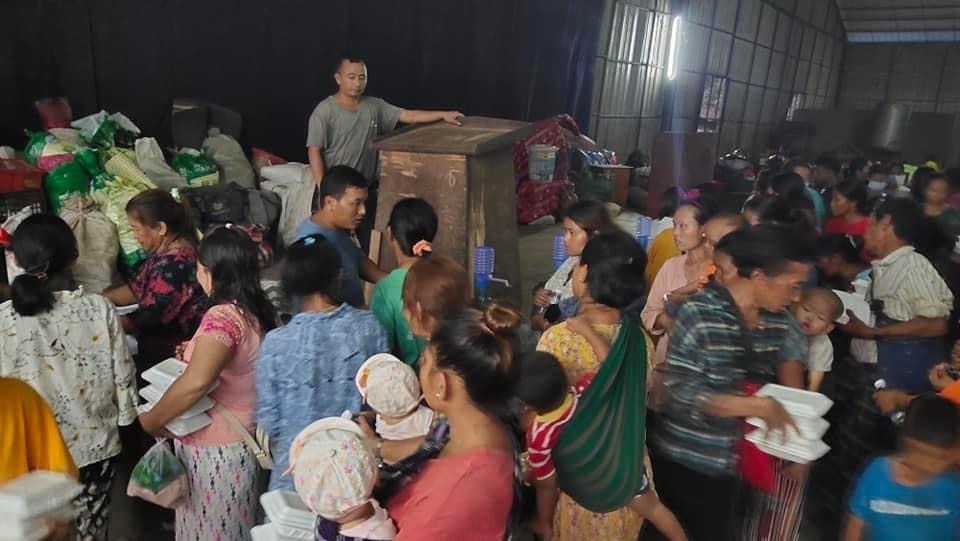At least two of three siblings hospitalized following the strikes that annihilated their village in Kachin State shortly before midnight on Monday have yet to learn that their mother was killed, according to a volunteer helping survivors.
One is too young—one-and-a-half-months old—while the three-year old is unconscious. It is unclear whether their elder brother, a six-year-old, can comprehend what happened.
“Their mother died at the camp while her three children suffered injuries from the bombing. The middle child is severely injured, and he remains unconscious,” the volunteer said, adding: “Their father is somewhere at a front line fighting against junta troops.”
Like his oldest son, he may not yet know that his wife had been killed. He also may not know that his three children have been hospitalized.
The three siblings are among the 57 people injured that night in a series of blasts that killed at least 29 people, including 13 children—one of whom was just one-and-half-years old.
Regime troops bombarded the village located about two miles north of Laiza Town, the Kachin Independence Army (KIA) said. Laiza is the KIA”s headquarters.
“A girl from my village lost all of her family members; her parents, her older brother and his wife. She is the only one who was not harmed because she was studying away from home,” a resident of Mung Lai Hkyet Village said. “Now she has nothing.”

She is not the only one. She is not the only one who lost an entire family, residents of the village that was home to internally displaced persons (IDPs) said.
The junta said on Wednesday that the deaths were a result of an explosion at a KIA warehouse containing about 105 tonnes of ammonium nitrate and weapons—countering the media reports that said the deaths were caused by the junta’s airstrikes or shelling.
KIA spokesman Colonel Naw Bu dismissed the regime’s account as “propaganda”, telling The Irrawaddy that the armed group would never position a gunpowder warehouse near civilians. A KIA investigation had determined that junta had either used a high-tech drone or a fleet of drones carrying bombs to strike the IDP camp, he added.
Other media reports say a series of blasts began shortly before midnight, with some reporting that the first one occurred at 11.30pm.
Former residents of the village told The Irrawaddy that there was a series of explosions. The first was massive, and it was followed by several more, they said. Some pointed to craters that they said were proof their village was obliterated by numerous bombs.
More than 600 IDPs from Mung Lai Hkyet Village are in urgent need of humanitarian assistance, local aid groups said on Wednesday.
Most former residents of the village are taking refuge in four shelters near the office of Woichyai IDP camp, a representative of the camp told The Irrawaddy on Wednesday.
“We are struggling … We don’t have enough space for a large number of people. We also don’t have enough food to feed them,” he said.
“They lost everything. We need to provide food, water, clothes, bedding, blankets, diapers, utensils and all sorts of commodities for them,” he added.
Road blocks due to ongoing fighting between KIA troops and junta infantry units make it almost impossible to deliver humanitarian assistance to the victims, said a volunteer from Myitkyina, Kachin State’s capital.
Former residents of Mung Lai Hkyet cannot return to their village because it no longer exists.
“We want justice … This is not the first time they [junta troops] committed crimes against humanity,” a Kachin human rights activist, adding: “I want to stress the need for humanitarian assistance for those affected.”
Following the massacre, the KIA and Myanmar parallel National Unity Government condemned the bombing as a war crime.
The United Nations responded with a press release. It quoted Secretary-General Antonio Guterres saying he was “alarmed” by the deaths and that “those responsible must be held to account.”
“The Secretary-General condemns all forms of violence, including the military’s intensifying attacks throughout the country, which continue to fuel regional instability,” the press release from Guterres’ office added.
The British embassy in Yangon also issued a statement. It said it was “appalled by reports of a Myanmar military strike” that killed civilians.

















